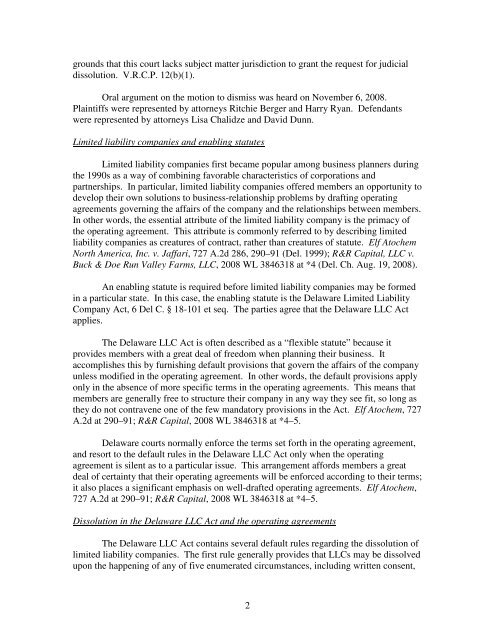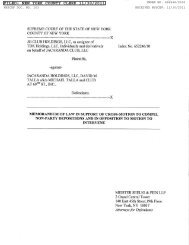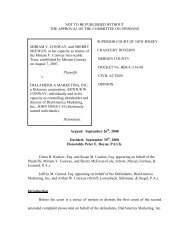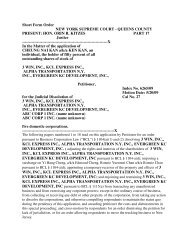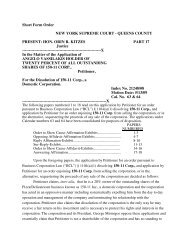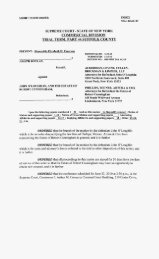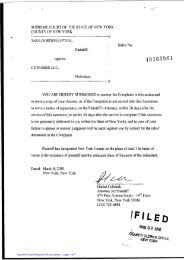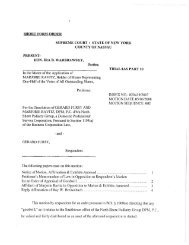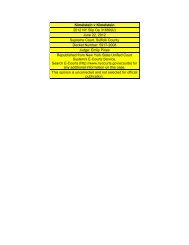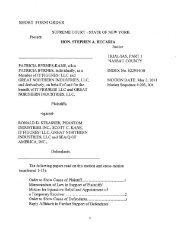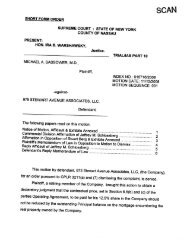Casella Waste Systems, Inc. v. GR Technology, Inc., Decision and ...
Casella Waste Systems, Inc. v. GR Technology, Inc., Decision and ...
Casella Waste Systems, Inc. v. GR Technology, Inc., Decision and ...
- No tags were found...
You also want an ePaper? Increase the reach of your titles
YUMPU automatically turns print PDFs into web optimized ePapers that Google loves.
grounds that this court lacks subject matter jurisdiction to grant the request for judicialdissolution. V.R.C.P. 12(b)(1).Oral argument on the motion to dismiss was heard on November 6, 2008.Plaintiffs were represented by attorneys Ritchie Berger <strong>and</strong> Harry Ryan. Defendantswere represented by attorneys Lisa Chalidze <strong>and</strong> David Dunn.Limited liability companies <strong>and</strong> enabling statutesLimited liability companies first became popular among business planners duringthe 1990s as a way of combining favorable characteristics of corporations <strong>and</strong>partnerships. In particular, limited liability companies offered members an opportunity todevelop their own solutions to business-relationship problems by drafting operatingagreements governing the affairs of the company <strong>and</strong> the relationships between members.In other words, the essential attribute of the limited liability company is the primacy ofthe operating agreement. This attribute is commonly referred to by describing limitedliability companies as creatures of contract, rather than creatures of statute. Elf AtochemNorth America, <strong>Inc</strong>. v. Jaffari, 727 A.2d 286, 290–91 (Del. 1999); R&R Capital, LLC v.Buck & Doe Run Valley Farms, LLC, 2008 WL 3846318 at *4 (Del. Ch. Aug. 19, 2008).An enabling statute is required before limited liability companies may be formedin a particular state. In this case, the enabling statute is the Delaware Limited LiabilityCompany Act, 6 Del C. § 18-101 et seq. The parties agree that the Delaware LLC Actapplies.The Delaware LLC Act is often described as a “flexible statute” because itprovides members with a great deal of freedom when planning their business. Itaccomplishes this by furnishing default provisions that govern the affairs of the companyunless modified in the operating agreement. In other words, the default provisions applyonly in the absence of more specific terms in the operating agreements. This means thatmembers are generally free to structure their company in any way they see fit, so long asthey do not contravene one of the few m<strong>and</strong>atory provisions in the Act. Elf Atochem, 727A.2d at 290–91; R&R Capital, 2008 WL 3846318 at *4–5.Delaware courts normally enforce the terms set forth in the operating agreement,<strong>and</strong> resort to the default rules in the Delaware LLC Act only when the operatingagreement is silent as to a particular issue. This arrangement affords members a greatdeal of certainty that their operating agreements will be enforced according to their terms;it also places a significant emphasis on well-drafted operating agreements. Elf Atochem,727 A.2d at 290–91; R&R Capital, 2008 WL 3846318 at *4–5.Dissolution in the Delaware LLC Act <strong>and</strong> the operating agreementsThe Delaware LLC Act contains several default rules regarding the dissolution oflimited liability companies. The first rule generally provides that LLCs may be dissolvedupon the happening of any of five enumerated circumstances, including written consent,2


